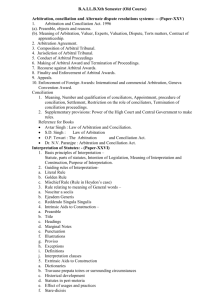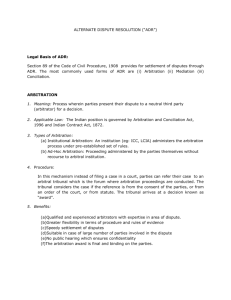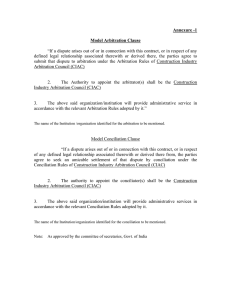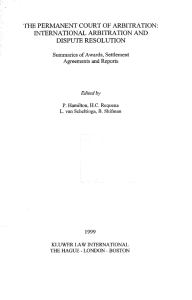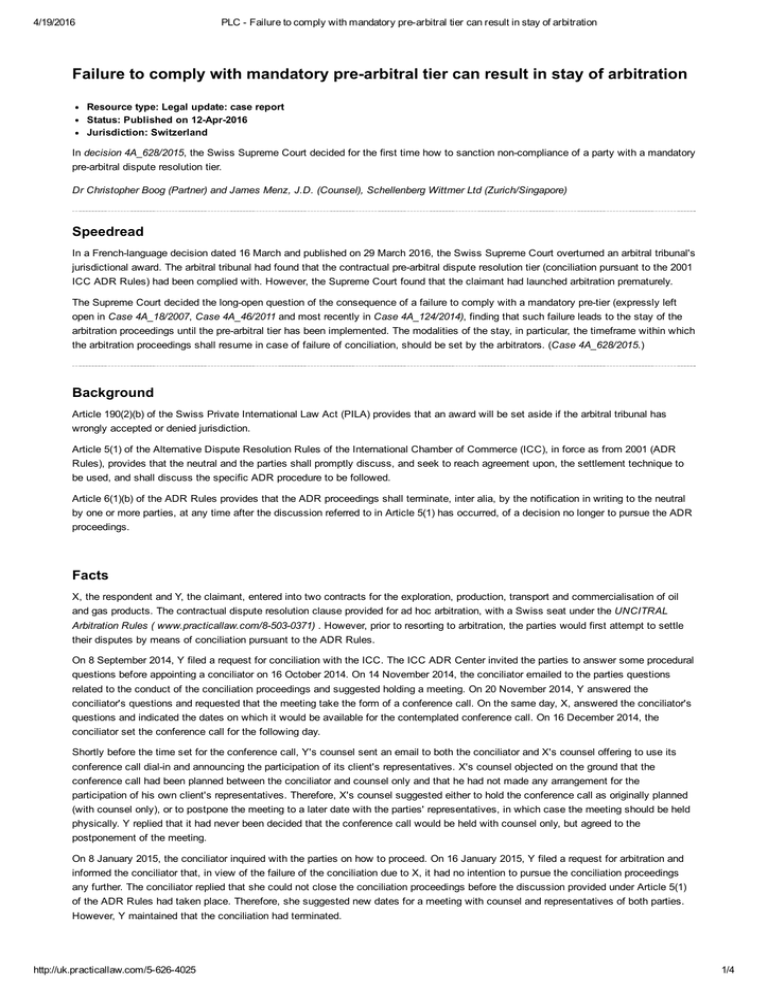
4/19/2016
PLC ­ Failure to comply with mandatory pre­arbitral tier can result in stay of arbitration
Failure to comply with mandatory pre­arbitral tier can result in stay of arbitration
Resource type: Legal update: case report
Status: Published on 12­Apr­2016
Jurisdiction: Switzerland
In decision 4A_628/2015, the Swiss Supreme Court decided for the first time how to sanction non­compliance of a party with a mandatory
pre­arbitral dispute resolution tier.
Dr Christopher Boog (Partner) and James Menz, J.D. (Counsel), Schellenberg Wittmer Ltd (Zurich/Singapore)
Speedread
In a French­language decision dated 16 March and published on 29 March 2016, the Swiss Supreme Court overturned an arbitral tribunal's
jurisdictional award. The arbitral tribunal had found that the contractual pre­arbitral dispute resolution tier (conciliation pursuant to the 2001
ICC ADR Rules) had been complied with. However, the Supreme Court found that the claimant had launched arbitration prematurely.
The Supreme Court decided the long­open question of the consequence of a failure to comply with a mandatory pre­tier (expressly left
open in Case 4A_18/2007, Case 4A_46/2011 and most recently in Case 4A_124/2014), finding that such failure leads to the stay of the
arbitration proceedings until the pre­arbitral tier has been implemented. The modalities of the stay, in particular, the timeframe within which
the arbitration proceedings shall resume in case of failure of conciliation, should be set by the arbitrators. (Case 4A_628/2015.)
Background
Article 190(2)(b) of the Swiss Private International Law Act (PILA) provides that an award will be set aside if the arbitral tribunal has
wrongly accepted or denied jurisdiction.
Article 5(1) of the Alternative Dispute Resolution Rules of the International Chamber of Commerce (ICC), in force as from 2001 (ADR
Rules), provides that the neutral and the parties shall promptly discuss, and seek to reach agreement upon, the settlement technique to
be used, and shall discuss the specific ADR procedure to be followed.
Article 6(1)(b) of the ADR Rules provides that the ADR proceedings shall terminate, inter alia, by the notification in writing to the neutral
by one or more parties, at any time after the discussion referred to in Article 5(1) has occurred, of a decision no longer to pursue the ADR
proceedings.
Facts
X, the respondent and Y, the claimant, entered into two contracts for the exploration, production, transport and commercialisation of oil
and gas products. The contractual dispute resolution clause provided for ad hoc arbitration, with a Swiss seat under the UNCITRAL
Arbitration Rules ( www.practicallaw.com/8­503­0371) . However, prior to resorting to arbitration, the parties would first attempt to settle
their disputes by means of conciliation pursuant to the ADR Rules.
On 8 September 2014, Y filed a request for conciliation with the ICC. The ICC ADR Center invited the parties to answer some procedural
questions before appointing a conciliator on 16 October 2014. On 14 November 2014, the conciliator emailed to the parties questions
related to the conduct of the conciliation proceedings and suggested holding a meeting. On 20 November 2014, Y answered the
conciliator's questions and requested that the meeting take the form of a conference call. On the same day, X, answered the conciliator's
questions and indicated the dates on which it would be available for the contemplated conference call. On 16 December 2014, the
conciliator set the conference call for the following day.
Shortly before the time set for the conference call, Y's counsel sent an email to both the conciliator and X's counsel offering to use its
conference call dial­in and announcing the participation of its client's representatives. X's counsel objected on the ground that the
conference call had been planned between the conciliator and counsel only and that he had not made any arrangement for the
participation of his own client's representatives. Therefore, X's counsel suggested either to hold the conference call as originally planned
(with counsel only), or to postpone the meeting to a later date with the parties' representatives, in which case the meeting should be held
physically. Y replied that it had never been decided that the conference call would be held with counsel only, but agreed to the
postponement of the meeting.
On 8 January 2015, the conciliator inquired with the parties on how to proceed. On 16 January 2015, Y filed a request for arbitration and
informed the conciliator that, in view of the failure of the conciliation due to X, it had no intention to pursue the conciliation proceedings
any further. The conciliator replied that she could not close the conciliation proceedings before the discussion provided under Article 5(1)
of the ADR Rules had taken place. Therefore, she suggested new dates for a meeting with counsel and representatives of both parties.
However, Y maintained that the conciliation had terminated.
http://uk.practicallaw.com/5­626­4025
1/4
4/19/2016
PLC ­ Failure to comply with mandatory pre­arbitral tier can result in stay of arbitration
The conciliator thereupon informed the parties and the ADR Center that she interpreted Y's conduct as a withdrawal of its request for
conciliation. The ADR Center confirmed that it also considered that Y had withdrawn its request for conciliation.
In the arbitration, X argued that the arbitral tribunal lacked jurisdiction as the mandatory pre­arbitral conciliation tier had not been complied
with, on the ground that the discussion referred to in Article 5(1)of the ADR Rules had never taken place. In a preliminary award on
jurisdiction dated 13 October 2015, the arbitral tribunal denied this objection and affirmed its jurisdiction. It first held that the conciliation
tier provided in the contract was indeed mandatory. Considering the circumstances of the case, the arbitral tribunal further held that,
contrary to the opinion of the conciliator and the ADR Center, a genuine conciliation attempt had indeed taken place in good faith between
the parties in accordance with the ADR Rules.
X filed a petition before the Swiss Supreme Court to set aside the award, arguing that the arbitral tribunal had wrongly accepted
jurisdiction. X argued that the Article 5(1) discussion had not taken place, as confirmed by the conciliator and the ICC ADR Center. The
arbitral tribunal should have declined its jurisdiction ratione temporis or, at least, stayed the arbitration proceedings in order to allow the
holding of a meeting between the parties and the conciliator.
Y submitted a number of counter­arguments, most importantly:
X's reliance on the pre­arbitral tier constituted an abuse of rights. Y itself had commenced the conciliation; X had not sought a
suspension of the arbitration to attempt conciliation, nor had it otherwise acted according to its alleged desire to seek an amicable
solution. X had filed a counterclaim in the arbitration; however it had not submitted this counterclaim in the prior conciliation attempt.
Finally, Y argued that X had obstructed the conciliation and that in any event, the tone of X's pleadings in the arbitration made clear
that X was not interested in settling the parties' differences by conciliation.
The parties' contract required merely an attempt at conciliation, but not necessarily one that had to adhere strictly to the ADR Rules.
The tribunal was not bound by the statements of the conciliator and the ICC ADR Center regarding the termination of the ADR
proceedings. An attempt at conciliation had been made and the tribunal had properly found that the discussion in Article 5(1) ADR
Rules had taken place. In any event, even if Y had "withdrawn" the request for conciliation, such withdrawal only had future and not
retroactive effect.
Decision
The Supreme Court granted X's application and set aside the jurisdictional award.
The court first rejected Y's interpretation of the contractual dispute resolution clause according to which all that was required was an
"attempt at conciliation" divorced from the procedures provided for in the ADR Rules.
Next, the court analysed whether these procedures had been complied with. It emphasised that Article 5(1) of the ADR Rules required a
meeting before either party could unilaterally terminate the conciliation. While the meeting did not have to be physical, and the discussion
could conceivably take place not in one single meeting but over the course of a sequence of exchanges, it had to satisfy the substantive
content of Article 5(1), that is it had to concern the specific ADR procedure to be followed. Such discussion, according to the court, never
took place in the case before it.
The Supreme Court then addressed Y's argument that X had acted against good faith. It distinguished its prior case law on the matter
(see Case 4A_18/2007 discussed in Legal update, First decision on FIDIC Dispute Adjudication Boards (Swiss Supreme Court) (
www.practicallaw.com/5­582­3245) ). Here, X had actively participated in the conciliation. When Y filed its request for arbitration, X
immediately objected in the conciliation. X also immediately raised a jurisdictional objection in the arbitration. The Supreme Court further
analysed X's pre­conciliation behaviour and its refusal to accede to Y's request, given with short notice, to have party representatives
participate in the 17 December 2014 call. X had in fact proposed a physical meeting of the party representatives in Paris. The court
emphasised that it was for Y to push the conciliation forward, and X's alleged "passivity" was not relevant. X was also not obliged to go
through conciliation for its counterclaim in the arbitration; had the conciliation been properly conducted, X could have introduced it there.
Finally, the fact that conciliation might appear hopeless now was not decisive, because:
X alleged that it was not hopeless at the time.
This would ratify Y's breach of the pre­arbitral tier after the fact.
In general, a third party neutral may be effective even at an advanced stage of a dispute.
This case was the first time, after the trilogy of related cases in 2007 (Case 4A_18/2007), 2011 (see Case 4A_46/2011 discussed in Legal
update, Multi­tier dispute resolution clauses: consequence of non­compliance with pre­arbitral procedural requirements (
www.practicallaw.com/1­506­7136) ), and most recently in 2014 (see Case 4A_124/2014 discussed in Legal update, First decision on
FIDIC Dispute Adjudication Boards (Swiss Supreme Court) ( www.practicallaw.com/5­582­3245) .) that the court has set aside an award
for failure to comply with a compulsory pre­arbitral ADR procedure. Accordingly, the court also had to decide the consequences of a
breach of a mandatory pre­arbitration tier.
http://uk.practicallaw.com/5­626­4025
2/4
4/19/2016
PLC ­ Failure to comply with mandatory pre­arbitral tier can result in stay of arbitration
First, the court confirmed that, in any event, a breach had to be sanctioned, dismissing a contrary view expressed by at least one
commentator. It then went on to remark that it maintained its statement made in its previous 2011 decision that "one could reasonably
doubt whether the controversial question could receive one answer applicable to all imaginable cases." Having made that general proviso,
the court decided, much in line with the majority of Swiss commentators, that such breach normally:
Should not entail a claim for damages for breach of contract because that would "not be a satisfactory solution".
Should rather entail procedural consequences.
Should not result in a declaration of inadmissibility or even a dismissal of the claim on the merits and closing of the arbitration since
this would "most certainly not be the most appropriate solution".
Should rather result in a stay of the arbitration pending compliance with the pre­arbitral tier.
The Supreme Court reasoned that to rule the claim inadmissible and terminate the proceedings would be uneconomical, forcing the
parties to go through the appointment of an entirely new arbitral tribunal (with potentially serious implications on, for example, limitation
issues). Therefore, a simple stay of the arbitral proceedings was far more appropriate. The court explained that the modalities of the stay
(in particular, the timeframe within which the arbitration proceedings were to resume in case of failure of the conciliation) should be set by
the arbitrators.
Comment
This is a very important case and, accordingly, is designated for publication in the official Supreme Court register as a "leading case". It
sets aside an arbitral award (which happens rarely in Switzerland); it furthers legal certainty by resolving a question left open since 2007,
and it provides important practical guidance because contractual pre­arbitral dispute resolution mechanisms are increasingly popular.
The case holds that where a party skips without a valid excuse a mandatory contractual pre­arbitration tier – whether by failing to
undertake the tier or by prematurely terminating the tier – the arbitral tribunal must stay the arbitration until the pre­arbitral tier has been
complied with. Despite the court's proviso that there may not be a sole solution to all possible scenarios, this case law can be expected
to apply to most cases.
It is noteworthy that the Supreme Court has struggled to place this holding on solid legal footing because, as it expressly acknowledges,
there is no clearly applicable basis in the Swiss lex arbitri to challenge the failure to respect the pre­arbitral tier. Accordingly, the Supreme
Court permits challenges under Article 190(2)(b) PILA, that is for lack of jurisdiction ratione temporis. By doing so, among other things, it
avoids a discussion of the thorny issue of the difference between jurisdiction and admissibility in international arbitration, which some
commentators argue lies at the heart of the problem of non­compliance with pre­arbitral tiers. At the same time, the court makes the
important (albeit obiter) statement that by admitting a challenge under Article 190(2)(b) PILA, the court implicitly finds that a violation of an
pre­arbitral tier is "certainly not sufficiently grave so as to amount to a violation of procedural public policy pursuant to Article 190(2)(e)
PILA … but [must] nevertheless be sanctioned in one way or another".
Overall, it is to be welcomed that the Supreme Court, very much in line with its general practice, employs pragmatic reasons in this case
(costs, risks of prescription), to achieve a satisfactory result on what some may consider a somewhat unsatisfactory doctrinal basis.
In sum, this decision completes the Supreme Court's sound line of case law regarding multi­tiered dispute resolution clauses. It strikes a
healthy balance between holding the parties to their bargain of seeking to resolve their dispute through other means of ADR prior to
resorting to arbitration (or litigation, as the case may be), whilst at the same time ensuring that the non­compliance of such pre­tiers
cannot be used (or abused) to entirely derail an arbitral process that has already been initiated. Parties to multi­tiered dispute resolution
clauses, and arbitrators having to deal with such clauses, now have clarity that:
The first step in dealing with such a clause is to decide whether the pre­arbitral tier is indeed mandatory. Guidance in that respect was
given in the 2007, 2011 and 2014 cases referenced above.
If it is mandatory, the Supreme Court will scrutinise closely whether the party seeking to rely on the non­compliance of the pre­tier has
indeed acted in good faith. If not, such party cannot rely on the non­compliance of the pre­tier, even if mandatory. Guidance in that
respect was given in the 2007, 2011 and 2014 cases referenced above.
If a pre­tier is mandatory and the party seeking to enforce such tier acted in good faith, the tribunal must stay the arbitral proceedings
until the pre­arbitral tier has been complied with, and should, in its order to stay, set the framework, including in particular the
timeframe, for the conduct of the pre­arbitral tier.
Case
Case 4A_628/2015 (Swiss Supreme Court).
Resource information
http://uk.practicallaw.com/5­626­4025
3/4
4/19/2016
PLC ­ Failure to comply with mandatory pre­arbitral tier can result in stay of arbitration
Resource ID: 5­626­4025
Published: 12­Apr­2016
Products: Arbitration (All jurisdictions), PLC Arbitration Email, PLC US Law Department
Related content
Topics
Arbitral Awards and Challenges (http://uk.practicallaw.com/topic0­203­6785)
Jurisdictional Issues: Arbitration (http://uk.practicallaw.com/topic3­363­4955)
National arbitration legislation (http://uk.practicallaw.com/topic3­381­2962)
Practice notes
Arbitration in Switzerland (http://uk.practicallaw.comtopic9­513­8272)
Enforcing arbitration awards in Switzerland (http://uk.practicallaw.comtopic1­573­3968)
Standard clause
Switzerland: ad hoc arbitration clause (http://uk.practicallaw.comtopic6­521­7299)
Legal update: archive
Multi­tier dispute resolution clauses: consequence of non­compliance with pre­arbitral procedural requirements
(http://uk.practicallaw.comtopic1­506­7136)
Legal update: case report
First decision on FIDIC Dispute Adjudication Boards (Swiss Supreme Court) (http://uk.practicallaw.comtopic5­582­3245)
External resource
UNCITRAL Arbitration Rules (http://uk.practicallaw.comtopic8­503­0371)
Country Q&A
Arbitration procedures and practice in Switzerland: overview (http://uk.practicallaw.comtopic5­502­1047)
Litigation and enforcement in Switzerland: overview (http://uk.practicallaw.comtopic1­502­1695)
Case page
Decision 4A_628/2015 (http://uk.practicallaw.comtopicD­037­0301)
©2016 Thomson Reuters. All rights reserved. Privacy Policy and Cookies(http://www.practicallaw.com/3­386­5597).Legal
Information(http://www.practicallaw.com/8­531­0965). Subscription enquiries +44 (0)20 7202 1220 or email subscriptions@practicallaw.com. The
reference after links to resources on our site (e.g. 2­123­4567) is to the PLC Reference ID. This will include any PDF or Word versions of articles.
http://uk.practicallaw.com/5­626­4025
4/4

